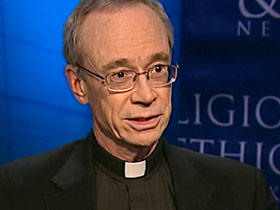“Clericalism was already present among the Twelve long before Constantine,” insists Jesuit scholar Thomas Reese – in response to a long article by James Carroll in the US journal ‘The Atlantic’.
An attitude of superiority among clergy, clericalism has been entitled ‘our ugliest perversion‘ by Pope Francis.
In ‘Abolish the Priesthood‘ Carroll had argued that the arrogance of the priesthood in its present form had originated in the legalisation of the church by Emperor Constantine in the 300s AD.
“Clericalism’s origins lie not in the Gospels but in the attitudes and organizational charts of the late Roman empire,” wrote Carroll.
Not so, argues Thomas Reese:
“In Matthew 20, we hear of the mother of James and John asking Jesus to “Command that these two sons of mine sit, one at your right and the other at your left, in your kingdom.”
“That this was not simply her idea is made clear by Matthew telling us that ‘When the ten heard this, they became indignant at the two brothers.’
“And Mark 9 tells us that Jesus had to chastise the Apostles for arguing about who was the greatest among them.”
Reese goes on to argue that there are traces of clericalism among the apostles even after Pentecost, the descent of the Holy Spirit on the early disciples following Jesus’s crucifixion and Resurrection.
The Acts of the Apostles Chapter six records that the Twelve thought they were above menial tasks, argues Reese. “It is not right for us to neglect the word of God to serve at table.” Out of this decision the first deacons were appointed.
“Clericalism is simply the manifestation in the church of very human temptations that are present in every organization,” argues Reese. “Ambition, pride, arrogance and the abuse of power. We are just shocked to find it in the church.”
For Thomas Reese’s complete article in National Catholic Reporter, click here.




0 Comments